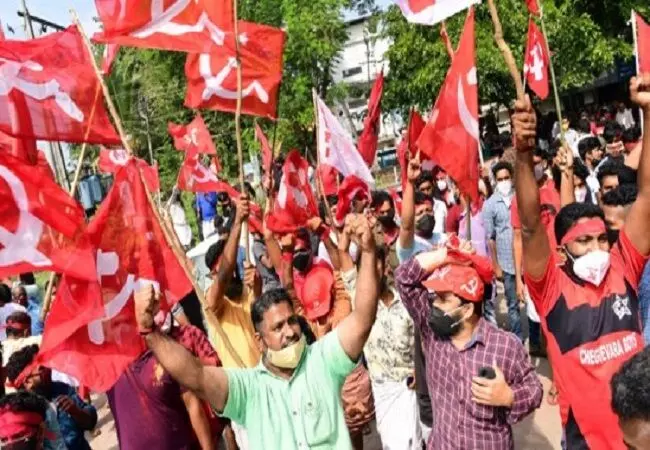
The takeaways from Kerala's local body election results
text_fieldsResults of Kerala's local government elections are clear pointers to the upper hand gained by the state's ruling Left Democratic Front (LDF) as much as to the setbacks of the Opposition United Democratic Front (UDF). Although not much different from the outcome of the 2015 local body polls, and with the upcoming elections to the state assembly due within months, the results are sufficient to disturb the UDF. In municipalities, the two fronts have won or less made an equal representation, and at the village, block and district panchayat levels as well as in the corporations, the LDF has been able to make impressive headway. The common pre-poll public perception was that the recent scams around the Pinarayi government with attendant allegations and even the string of investigations by the Centre's investigation agencies had put the government very much on the defensive. And the opposition UDF leaders had latched on to those issues, even working overtime with virulent campaign. But despite this unfavourable background, the government and the LDF can now comfortably hold up the argument that all of them failed to influence the people, or more specifically, the panchayat-municipal election outcomes.
There has also been one factor of party equations that helped the LDF: the split in the Kerala Congress-M which wields considerable influence over the Christian community of central Kerala, and its desertion of the UDF, soon followed by the LDF welcoming and inducting the Jose K. Mani faction into the LDF fold. This turned out to be a game-changer in the region for the LDF and loss for the UDF. The LDF thus made crucial inroads into the electorate of those parts. When the party, which the late KM Mani had nurtured as a family property with leverage on his community and its church, was inherited by his son after his death, that was nothing unusual in the Indian context. That being so, the UDF leadership may now be ruing its failure to recognise this and factor it in towards its electoral strategy.
It should go to the credit of the LDF that the government was able to use its popular and government machinery for conducting effective publicity for its development achievements over the last four and a half years, and also for convincing the people that this was accomplished in spite of unfavourable stances of the central government. All the same, the Opposition failed to objectively expose the misuse of power, corruption and nepotism that marked many of LDF's development initiatives. When the government went roughshod over minority communities' legitimate interests with the introduction of the constitutionally challenged economic reservation, solely with votes in mind, conversely the UDF out of fear of losing votes, was not able to oppose the move; and that cost the UDF dearly even as the LDF benefited from it by winning new votaries. Together with the switch of Jose K Mani's faction to the LDF, as per indications from the grassroots, this decision on economic reservation resulted in a shift in stance of the Catholic church leadership. And as a supplementary plank, the incessant harping by the chief minister and his party CPM, on the threat of 'Muslim extremism/communalism' cannot be excluded from factors swayed a section of voters in its favour.
It is to be noted that the Left front's intensive campaigns against Muslim masses' thinking was conducted at the expense of certain relatively small and new parties who had entered the electoral fray with due registration with the Election Commission and who functioned after written guarantee of their commitment to secular democracy. Still the CPM and its organs were strident in propaganda about the local-level electoral understanding of the Welfare Party of India with some UDF constituents, and attributed even international dimensions to the issue; although this had a reverse effect in the Malabar region, in southern parts this apparently raised suspicions against the UdF. All the same, the poll results also indicate that the CPM felt no inhibitions in reaching clandestine understanding with factions which it had branded as communal extremists and had even clashed with on streets. And in the process, the nervousness of some in the UDF leadership at the face of such communal propaganda should have worked to the benefit of the LDF. Above all, there is truth in what the leaders of the Congress, the main UDF constituent, themselves point: the organisational instability within the Congress, acted as the main cause of its setback. The sooner the UDF leadership becomes prepared for a rethinking, overhauling and intra-party introspection, the faster their track in the path of survival.
It is also worth weighing whether the ruling party at the Centre which entered the electoral battle with fanfare and tall claims, has fallen short making any respectable gains. The BJP, which had kept asserting that they would rule the capital Thiruvananthapuram, only suffered a jolt from the city. The lotus could not garner the votes which the Congress lost, and that enabled the Left front to get entrenched in power there. True, among municipalities the BJP this time added Pandalam to Palakkad which it had already been ruling, which can be counted as its growth, but the saffron party has achieved only marginal improvement, as illustrated by the poll results. And if wants to make any further gains in the soon to be held assembly elections, the party will have to toil much more.






